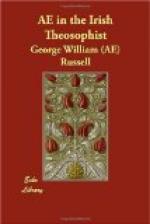And now, changing from particular types, how do we look upon Theosophy as a power in Ethics? We find the elimination of the selfish instinct insisted upon as necessary for the progress of the Ego through its material envelope to a full and complete knowledge of its higher self; we find the doctrine of Brotherhood put forward in its noblest aspects; we find as a necessary corollary that responsibility is increased and widened with an accompanying sense of power to accept and carry on that responsibility; with the growth of higher feeling within us comes a sense of added strength; we learn gradually to work without consideration or anxiety for results; we grow more tolerant of our neighbor’s shortcomings, and less so of our own; we find that by disengaging ourselves from the objects of the senses, we become indifferent to small troubles, and more free to assist our neighbor when they press on him; with the knowledge of the causes of present conditions lying in past action, and our present actions going to be the causes of future conditions, we place ourselves in a position to work to the full extent of our powers to set in motion such causes as will bring about the happiest results for Humanity as a whole; we learn to look upon death, not as the opening of the spiritual life, but as a release from a weight which keeps under the spiritual life, which is always with us, now as well as before birth and after death; we learn to sense the methods by which the universe works out its destiny; we find every day growing stronger that sense of immortality, of absolute union with the universal soul, which at first merely manifested itself in strange feelings and emotions; we find the clues to the control of our physical and mental faculties, and are not surprised to discover the ten-thousand-fold increase in value these faculties then bear; we put ourselves more and more in harmony with what we feel to be the source of all Truth; we find ourselves gradually able to give expression to those dumb feelings which we could not find words for, of its grandeur and greatness; until finally we come, after many incarnations, after suffering, after despair sometimes, to a knowledge which transcends all human knowledge, to a bliss which is above our present ideas, to a peace which the world cannot give, which surpasseth all understanding, and are then ready to give up that bliss and peace, and to use that knowledge for the divine compassion towards our fellows who are following.
But how are we to hope for this progress? What are we to do to realize these ideas? Is it by wishing for it that this state will come about? Is there no everyday way of getting forward? These are some of the questions which will rise naturally to the lips of any here who are not thoroughly acquainted with Theosophical ideas: and what have we to say in reply? Are we to confess Theosophy is a doctrine only for the learned, the cultured, the wealthy? Are we to acknowledge that Christianity




